
(Bronislaw Malinowski)
圖片引自www.nndb.com/people
布羅尼斯拉夫·馬裏諾夫斯基 ( Bronislaw Malinowski)( 1884年 — 1942年 ),波蘭人 ,英國 著名社會人類學家 。創立人類學功能論(Functionalism) 學派,主張以功能論的思想和方法論從事文化的田野調查與研究。
1914年開始,曾在巴布亞新幾內亞(Papua New Guinea) 的麥盧(Mailu)和特羅布裏恩群島(The Trobriand Islands) ,美拉尼西亞(Melanesia),澳大利亞的庫拉(Kula) 進行人類學田野調查。
1922年,馬裏諾夫斯基獲得人類學博士學位,任教於英國倫敦經濟學院(the London School of Economics) 。晚年曾遊學於美國康內爾(Cornel),哈佛(Harvard),耶魯(Yale)。因而他的人類學理論和田野方法大部分被美國人類學派(所謂博亞茲學派—Boasian influence school,因Franz Boas而得名)所采用。從而使他成為二十世紀最有影響的人類學家 之一。
主要論著有:
澳大利亞土著人的家庭(The Family Among the Australian Aborigines )(1913)
麥盧的土著人(The Natives of Mailu) (1915)
特羅布裏恩群島(The Trobriand Islands) (1915)
西太平洋的航海家(Argonauts of the Western Pacific) (1922)
文化科學論(The Scientific Theory of Culture) (1922)
原始心理學神話Myth in Primitive Psychology (1926)
原始社會的犯罪與習俗(Crime and Custom in Savage Society) (1926)
原始心理學之父(The Father in Primitive Psychology) (1927)
原始社會的性與壓抑(Sex and Repression in Savage Society) (1927)
美拉尼西亞西北部原始人的性生活(The Sexual Life of Savages in North-Western Melanesia) (1929)
珊瑚園及其巫術(Coral Gardens and Their Magic) (1935)
信仰與道德的基礎(The Foundations of Faith and Morals) (1936)
(文化的科學理論)A Scientific Theory of Culture (1944)
自由與文明(Freedom and Civilization) (1944)
文化變化的動力(The Dynamics of Culture Change) (1945)
巫術,科學與宗教及其它論文(Magic, Science, and Religion and Other Essays) (1948)
詞義精確的日記(A Diary In the Strict Sense of the Term) (1967)




